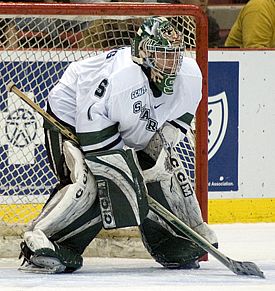Scott: Well, Jim, it looks like the usual order of things has been restored in Hockey East, with New Hampshire and Boston College back on top of the standings. I have to confess that I’m disappointed, not because I don’t like those schools, but I do like surprises, and the UMass/Mass-Lowell/Northeastern triumvirate was one of the best stories of the first half of the season. Now it looks like Providence is trying to be the surprise team — the Friars’ game with Boston College this Friday should tell us a little something about both teams, wouldn’t you say?
Jim: Brownie, when you look at everything top to bottom in Hockey East, it seems that two of the perennial top four won’t be there come season’s end. BU is struggling and really didn’t look like much of a powerhouse against UNH last weekend, while Maine may be in just too much of a hole to come back. I would say that I don’t want to be any team playing either of those two teams come first round of the playoffs. All that said, that makes room for two new teams in the top four. I love the way that Providence is playing right now. I saw the Friars really take it to Michigan (but strangely lose, 6-0) and then hammer Michigan State back at Christmas. I then got a look at them hammering Lowell only to come out on the short end because of a few major lapses on the Friars’ part. Truth be told, if this team can pull it together for 60 minutes each night, they’re a true power. I was glad to see them earn some respect in the polls this week. Talking about the polls, your alma mater, Michigan State, certainly made a statement that they deserve respect in the polls.

Scott: Very kind of you to give me an opening to brag about my Spartans. You know, the funny thing about Michigan State the last couple of years is that although the Spartans definitely still play defense, there’s a lot more offense than folks might realize. MSU is seventh in the nation in goals per game and 12th in scoring defense, giving the Spartans a goal-per-game scoring differential on their opponents. And unlike the Ryan Miller era, during which shots on net by State’s opponents were few and far between, Jeff Lerg is seeing a lot of rubber — nearly 30 shots per contest, more than any other netminder. By the way, we all know scoring is down these days, but what does it say about the game that a goals against average of 2.17 is only 17th in the country, and a save percentage of .925 is 13th?
Jim: You make a really good point about scoring defense and goaltending. Not to sound like that guy who tells stories about the past, but I do remember my days at Lowell when Dwayne Roloson was an All-American with a goals against average around 4.00 and a save percentage around .910. What a difference there is in today’s game. I do believe that a lot of this has to do with both the improvement in equipment as well as the changes in coaching. College goaltenders are getting better instruction now than ever. As for MSU, I agree that they can certainly score and that makes a major difference when you already have a decent defense in place. But as you point out, this team isn’t exactly the greatest in helping out its goaltender. Jeff Lerg sees way too many shots per game. That is something that generally becomes much more evident the later you go in the post-season.
Scott: Agreed. Especially when you get to single-elimination in the NCAA tournament, all it takes is one goal at the right time to produce a national champion, and it goes without saying that a shot on net is a prerequisite for scoring that goal. Lerg had to stop a lot of shots last year too, but the numbers are up even further this season. But since we’re talking about the postseason, is it too early to start rummaging through the PairWise? Last season at the WCHA Final Five, I was besieged by questions about why we were projecting just three WCHA teams and five from Hockey East in the national tournament. The fact then was that teams like Denver were simply on the wrong side of the bubble while Massachusetts was on the good side. Well, here we go again with the dogfight — right now, teams 10 through 18 in the PWR are all from the WCHA or Hockey East, with UMass and UML just on the wrong side at the moment. Your thoughts?
Jim: The most important thing to remember about the PairWise is that NOTHING matters until every regular and conference tournament game has been played. All that said, the PairWise gives us reason to speculate. And just like Tom Brady’s leg/ankle/foot, speculation is what drives this world. Right now, I think that UMass and Lowell belong on the wrong side of the bubble. The Minutemen are solid but inconsistent, while Lowell, last weekend against Minnesota-Duluth, didn’t seem to match up to the WCHA’s competition. I only saw Saturday’s game, but the Bulldogs ran all over the River Hawks, dominating the game physically. If that’s the style of hockey that the WCHA will deliver, in general, in the postseason, they should have an advantage against the east. All this said, we’re ignoring the fact that the RedHawks are back at the top of the poll. Miami seems to be playing very well right now. This is an idle week for Miami, but next week brings what could be a No. 1 vs. No. 2 matchup with Michigan. Good timing for a clash of the titans, no?
Scott: Nothing like a series between the top two teams in the nation to generate some press, that’s for sure. I think we’ve said this before, but it’s worth repeating: it’s really something what Rico Blasi has accomplished with the RedHawk program. They’re heading toward a fourth NCAA appearance in five seasons, and with Notre Dame in ascendancy alongside the usual suspects in Michigan and Michigan State, you now have four top-caliber programs in the CCHA that should contend for national titles for years to come. And it’s a good thing Miami’s got Blasi signed until pretty much the end of time, because he’s young, he’s successful — in short, he’s the perfect candidate for a big-budget program to try to steal.
Jim: I do like your optimism about the CCHA, but also am cautious of the fact that all of this is cyclical. I do, though, recall Jerry York talking recently at the Frozen Four about the fact that success breeds success. If your team wins, the upperclassmen on that team leave a legacy for the underclassmen. At the same time your school becomes more attractive to recruits. That’s why the continued success of teams like Notre Dame and UMass, both looking for their second consecutive NCAA bids, could be important to change the current complexion of college hockey. For now, though, we can worry about the stretch run. Oh, and the Beanpot, of course, which will be a major topic come next week. Until then…


